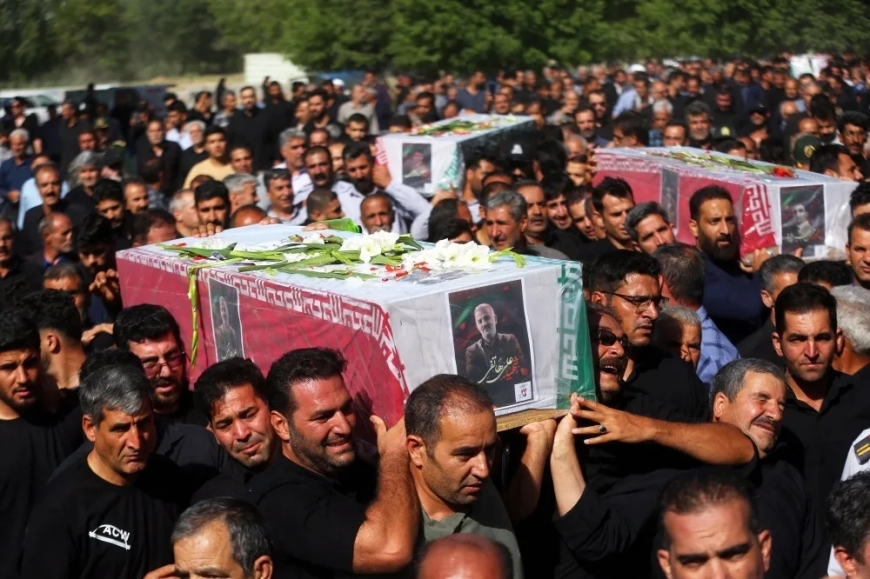G7 Leaders Urge Middle East De-escalation Amid Israel-Iran Conflict; Trump Leaves Summit Early
G7 leaders call for Middle East de-escalation amid Israel-Iran conflict; US President Donald Trump departs early from Canadian summit after backing Israeli strikes and warning Tehran citizens.

Kananaskis, Canada, En Indonesiaupdates - Leaders of the Group of Seven (G7) industrialized nations called for urgent de-escalation in the Middle East on Monday, amid intensifying conflict between Israel and Iran. The summit, hosted in the Canadian Rockies, was marked by the early departure of U.S. President Donald Trump, who left the gathering to respond to the crisis.
Trump, who recently returned to the international diplomatic stage, left the summit ahead of schedule as Israel conducted a series of military strikes targeting Iranian nuclear and military facilities. Iran responded with retaliatory drone and missile attacks, escalating fears of a broader regional war.
In a dramatic post on his Truth Social platform, Trump warned residents of the Iranian capital: “Everyone should immediately evacuate Tehran!”
Despite earlier reluctance to back a joint statement, Trump eventually supported a G7 declaration released by summit host Canada. The statement emphasized the need for a broader de-escalation across the Middle East, including a ceasefire in Gaza. It also reaffirmed Israel’s right to self-defense while urging the protection of civilian lives on both sides of the conflict.
“We urge that the resolution of the Iranian crisis leads to a broader de-escalation of hostilities in the Middle East, including a ceasefire in Gaza,” the statement read.
The G7 leaders — representing Canada, the United States, the United Kingdom, France, Germany, Italy, and Japan — also reiterated their unified stance that Iran must never be allowed to develop nuclear weapons.
Trump had previously expressed support for diplomacy, with his envoy Steve Witkoff holding five rounds of talks with Iranian counterparts. However, he blamed Tehran for failing to accept U.S. terms, expressing frustration and backing Israel’s military response.
“It’s painful for both parties, but I’d say Iran is not winning this war, and they should talk, and they should talk immediately, before it’s too late,” Trump said during a bilateral meeting with Canadian Prime Minister Mark Carney.
Macron Voices Caution Over Regime Change
French President Emmanuel Macron warned against perceived efforts to topple Iran’s clerical regime, drawing parallels with past failed interventions in the Middle East.
“All who have thought that by bombing from the outside you can save a country in spite of itself have always been mistaken,” Macron said.
Since the U.S. withdrew from the 2015 Iran nuclear deal in 2018 under Trump’s previous administration, Iran has increased its uranium enrichment, although it has not reached the threshold to build a nuclear weapon. Meanwhile, Israel, though widely believed to possess nuclear weapons, has never officially acknowledged its arsenal.
Trump Pushes Trade Agenda, Hints at Russia’s Return
In addition to the Middle East crisis, the summit also touched on trade tensions. Trump reaffirmed his intention to implement sweeping tariffs starting July 9 but expressed optimism about resolving disputes with Canada and the United Kingdom. He signed new economic agreements with UK Prime Minister Keir Starmer and voiced newfound respect for Canada under Prime Minister Carney’s leadership.
In a controversial remark, Trump suggested that Russia’s expulsion from the G8 in 2014 may have contributed to the ongoing war in Ukraine.
“If Russia were still a member, you wouldn’t have a war right now,” he said, noting that Russian President Vladimir Putin felt “very insulted” by the group's previous decision to expel Moscow.
Trump will miss the final day of the summit, which was expected to include discussions on the war in Ukraine and North American cooperation with Mexican leaders.
As global leaders seek to contain multiple overlapping crises, Trump’s assertive moves continue to reshape international diplomacy — with high stakes and unpredictable outcomes.
















